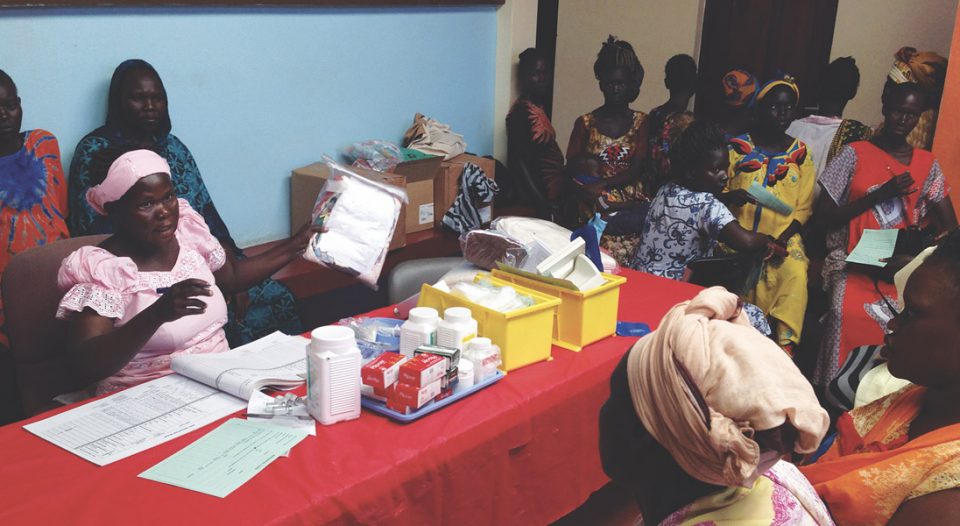Agong smiled when the medical team made its rounds. After obstetric fistula surgery, she hoped that four years of incontinence—the result of an injury during a prolonged labor and delivery—would end.
Her surgery took place at the Reconciliation Lutheran Community Center and Primary Health Care Clinic outside Juba, South Sudan. Through education, worship and health care, the center serves residents displaced by ongoing civil conflict between the country’s Dinka and Nuer peoples.
Youth whose education was interrupted by war come to Reconciliation to study, use computers and spend time together. Women learn how to start small businesses. Christians gather for worship led by ELCA missionary and pastor Mawien Ariik, a Dinka. And mothers like Agong (last name withheld) come for healing.
Women with fistulas may suffer urinary or fecal incontinence. They are often shunned by their husbands and community because a fistula is smelly and uncomfortable, and it makes physical intimacy difficult and childbearing impossible.
Reconciliation’s “Fistula Camp” unites mothers with surgeons who repair these tears or holes between the vagina and urethra or large intestine that can happen during difficult births and deliveries, especially when no midwife or doctor is present.
If the surgery succeeds, it frees women from pain and shame.
“Seeing [mothers] who have lived with fistula from four months to 40 years, all dry and rejoicing, is powerful. This is a ministry of reconciliation and restoration of wholeness in the name of Christ.”
“Hosting Fistula Camp is a team effort,” said Benyam Kassahun, ELCA program director for East and Southern Africa.
John Sabit, Reconciliation’s medical director, recruits candidates for surgery through posters, radio ads and word of mouth. He also arranges their transportation to and from the center.
Medical personnel convert classrooms to surgical wards, arrange meals, hire additional nurses and an anesthesiologist, and do the preliminary blood work. They organize supplies donated by Global Health Ministries, an independent Lutheran organization that also helps fund the camps.
The surgical teams come from the Arusha and Selian Lutheran medical centers, ministries of the Evangelical Lutheran Church in Tanzania. Mark Jacobson, a doctor and ELCA missionary, leads the camps. He said the Tanzanian teams, which have done approximately 5,000 fistula repairs over the last 15 years, are now sharing their expertise in South Sudan.
“Seeing [mothers] who have lived with fistula from four months to 40 years, all dry and rejoicing, is powerful,” he said. “This is a ministry of reconciliation and restoration of wholeness in the name of Christ.”
Campaign-funded care
So far 30 women have received operations during two weeklong Fistula Camps. More camps are in the works to serve additional mothers and address cases where multiple surgeries are needed.
To prevent new cases, Jacobson said pregnant women need birth attendants who can handle complications, plus access to better obstetric care in clinics and hospitals.
Opened in February 2018, Reconciliation’s clinic served 10,000 people in its first year, including many women seeking prenatal care. The clinic addresses the most common challenges faced by expectant mothers, including malaria, urinary tract infections, anemia and low weight due to nutritional problems. The staff also delivers babies and refers mothers with complications to bigger facilities. The clinic’s presence alone assists in fistula prevention.
Gifts from Always Being Made New: The Campaign for the ELCA were critical to this ministry. “Each day over 70 women and girls are offered important medical care [at the clinic], a service they would not be able to access otherwise,” said Andrew Steele, former director for global mission funding. “Thanks to the financial gifts from congregations, individuals and synods, thousands of lives are being impacted in Juba.”
What’s next for this ministry?
With 60,000 women with untreated fistulas in South Sudan and 2 million worldwide, Fistula Camp organizers hope to expand its outreach beyond Juba.
Leaders have built relationships with the country’s Ministry of Health to explore setting up camps in the rural northern states where fistula repair is rare. With the Juba Teaching Hospital, Jacobson and others train South Sudanese physicians to become fistula surgeons.
This medical ministry and the center’s holistic, ongoing work benefit the ELCA too. “The center has given us a new vision of how to do holistic ministry,” Kassahun said. “It shows us how to serve the whole person, physically, vocationally and spiritually. As well, it is building our capacity to achieve a shared goal through collaboration among ELCA synods, congregations, international church bodies and independent Lutheran organizations like Global Health Ministries.”
Steele agrees: “This has been a shining example of how God’s abundance allows us to be bold for the gospel as we accompany our brothers and sisters around the world.”





